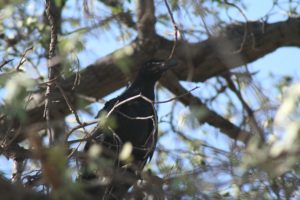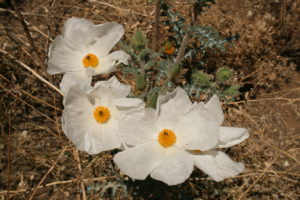 Corvus cryptoleucus is the Chihuahuan Raven. Corvus is Latin for crow and is the scientific name Linnaeus gave crows and ravens. Cryptoleucus is from two Greek words and means hidden white, referring to white feathers found on the neck of this raven which you seldom if ever see. Well, maybe on a windy day or if you’re holding it I guess. In southeastern Arizona we are blessed with two species of ravens. The Chihuahuan Raven is common around our place in the desert grassland and desert scrub. The larger Common Raven can be found in the mountains, but I have a wonderful memory of one that visited our home in the Sonoran Desert northwest of Tucson. To quote a favorite bird book, Common Ravens “are found where Chihuahuan Ravens are absent”. There you go. And who doesn’t love the whole family Corvidae. The Corvids are the crows, ravens, jays and magpies. Yay Corvids!
Corvus cryptoleucus is the Chihuahuan Raven. Corvus is Latin for crow and is the scientific name Linnaeus gave crows and ravens. Cryptoleucus is from two Greek words and means hidden white, referring to white feathers found on the neck of this raven which you seldom if ever see. Well, maybe on a windy day or if you’re holding it I guess. In southeastern Arizona we are blessed with two species of ravens. The Chihuahuan Raven is common around our place in the desert grassland and desert scrub. The larger Common Raven can be found in the mountains, but I have a wonderful memory of one that visited our home in the Sonoran Desert northwest of Tucson. To quote a favorite bird book, Common Ravens “are found where Chihuahuan Ravens are absent”. There you go. And who doesn’t love the whole family Corvidae. The Corvids are the crows, ravens, jays and magpies. Yay Corvids!
Argemone platyceras is the Pricklepoppy. The genus Argemone is from a Greek word for cataracts and refers to an old medicinal use. The specific epithet platyceris refers to the flattened hornlike sepals of the beautiful huge white flower. Around you and me Pricklepoppy…..I so want to call it Sunny Side Up Poppy……..is found from 1,500’ to 8,000’ and blooming throughout most of the year. You may want to look it up in a favorite herbal to see what other old time or even current medicinal uses it has.
A couple notes: the photos are mine. The raven is a goofy looking youngster up the Emory oak where its nest is found. The Pricklepoppy is a only a few feet away from our front door. They are very prickly, but flowers to die for don’t you think?


I use the common name wild cotton, but here are some other common names: Thurber’s cotton, desert cotton, and algodoncillo. Your choice, but if...

Petey will never be a learned fellow, but he’s a pretty nice fella. Tufted evening primrose (Oenothera caespitosa) is beautiful wildflower of the uplands. ...

I thought I was through mourning the death of an old friend until an upcoming musical gig brought it all back to me. Well,...